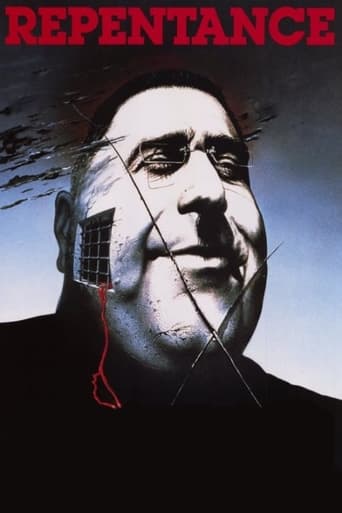butskhrikidze
This movie has amazing cinematography, phenomenal screenplay, incredible acting, it's a masterpiece.
Armand
At first sight it is movie of one actor. Axis of grotesque world, master of hideous mask, puppeteer of essence of every dictator, Avtandil Makharidze is great in this parable-satire about power and pure cruelty. At first sight it is movie of its director, result of need to confess events of dark years, to cry - king is naked ! - after a deep and large silence. At first sight it is a gray fairy -tale in which monster is killed by delivery of truth. A woman for who past is blood of present. A cake, an artist, ruins of existences, look of nephew, a trial. At first sight it is tale about Varlaam. In fact it is only a masterpiece.
gentendo
A community governed by paranoia, injustice and revenge exposes the truth of those who hide behind certain pretenses while revealing the false accusations of those who stand for justice. It is a community that has mistaken that which is good for that which is evil. The people within the community have been duped by a powerful political figure named Varlam. Though his actions and motives from the outside appear interested in the common good, on the inside he is really a menacing tyrant who stops at nothing for possession of absolute power and control. He is representative of many cultural tyrants throughout the ages—Hitler, Mussolini, and Stalin. When challenged by the commoner, he unjustly oppresses them; stripping them of their rights and in worst case scenarios, killing them (very similar to every other tyranny in history). All this is done in order to maintain the status quo. Two primary characters who challenge Varlam and his governing despotism are Sandro and his daughter Keti. Both see through the governing façade and seek to expose Varlam's deceit to the common people. However, most within the community conform to a type of herd-mentality; never questioning the governing morality but always blindly obeying the powers at hand. Sandro and Keti are those who are falsely accused by Varlam due to his fear of losing political standing in the eyes of the people. Both are imprisoned: Sandro for revolutionary artwork; Keti for unceasingly digging up Varlam's dead body. The irony, then, is casted upon the dichotomy between those in the community who revere Varlam as a political demigod (e.g. as seen by those who mourn at his death) versus those who see him as he really is—a manipulative and insatiable power monger. Comparing this community to those of the past and present, it varies with an interesting dynamic: Governments that do not have security checks and balances will always become corrupt, causing the people to mourn. Interestingly enough, however, though the government in this film was corrupt, the majority populace did not seem to notice. Ironically, then, when Varlam dies the people do not celebrate in delight of becoming free, but instead mourn because they believe that they had lost a great political leader.The community also displays an interesting clash between church and state. "State" in this sense, can be more properly rendered as science. Thus, then, is the battle between religion and science. A recording of Albert Einstein's last public address helps capture the essence of this battle during a particular dream sequence: Man's drive for science will cause him to create weapons of destruction upon himself less he finds a spirituality higher source of strength. This spiritually higher sense of living is captured through the film's theme of repentance—changing from one state of being to another. Religion seems to be the spiritual strength of the community. The passion to keep religion alive in the community is explicitly demonstrated during Sandro's appeal to Varlam in hopes that he'll extinguish certain lab-experiments from the church's monumental sites. Though Sandro's appeal is promised to be fulfilled, it is here that Varlam begins to suspect Sandro of revolutionary ideas. Not till later in the film when Varlam, unknown to the public, burns down the church does it seem that the gross secular world is taking over. The God of religion is losing its voice while the God of politics—Varlam—is securing his voice as to what is supreme. The old lady's comment at the end of the film implies what the importances of churches are: "What good is a road if it doesn't lead to a church?" Churches are symbols of spiritual places in which to worship God. If man made roads are not built in ways that would lead to spiritual roads of God, what hope does man have of ever getting anywhere in life? If a community is built upon the belief in God, they are more likely to prosper due to recognizing how little they can achieve on their own. With the help of God in their lives, all things are possible.
Douglas_Holmes
(Possible spoiler): A story about dictatorship and its socially corrosive influence, this heavily-symbolic film has as its main character a Georgian SSR Governor who is the embodiment of Stalin, Hitler and Mussolini in one man. As the film progresses, it becomes apparent that he is losing any grip on reality which he may have possessed (note, for example, his statement that four out of every three people are traitors to the revolution, or somesuch.)The movie, brought to the West by SovExportFilm and Cannon Films, is sheer brilliance. It captures the cold, gray, bureaucratic facade of tyranny.




